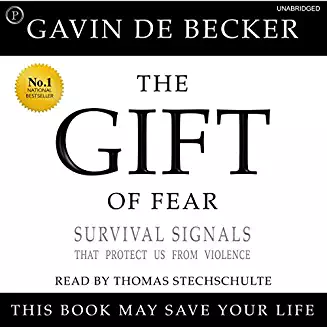 The Gift of Fear and Other Survival Signals that Protect Us from Violence by Gavin de Becker, Dell Trade Paperback, 1999, also available in other formats. I’m not sure why I was reminded of this book and put it on hold at the library. I had read it before and remembered portions of it quite well, but it was well worth re-reading. De Becker runs a security firm, providing services and counseling to people who feel and/or indeed are under threat. He himself grew up in an extremely violent home, but instead of becoming violent himself he decided to help reduce violence by giving people the tools they need to protect themselves.
The Gift of Fear and Other Survival Signals that Protect Us from Violence by Gavin de Becker, Dell Trade Paperback, 1999, also available in other formats. I’m not sure why I was reminded of this book and put it on hold at the library. I had read it before and remembered portions of it quite well, but it was well worth re-reading. De Becker runs a security firm, providing services and counseling to people who feel and/or indeed are under threat. He himself grew up in an extremely violent home, but instead of becoming violent himself he decided to help reduce violence by giving people the tools they need to protect themselves.So part of the appeal of this book comes from its being written by someone who has lived through horrific events and emerged to become a positive force. I was especially struck by his ideas on how even the smallest positive interaction with a child may make a huge difference. He remembers a fifth-grade teacher who took the time to interact with him and treat him as worthwhile. Acts of kindness are never wasted.
Another fascinating idea in the book, albeit not quite so appealing, is that the actions of a murderer, a stalker, or a rapist are always explainable. Not excusable; explainable. Even the acts of the insane make sense–when viewed within that person’s worldview. Any open-minded reader of this book would have to accept that man has a sin nature. His many real-life illustrations are perfect examples of the truth of Jesus’ words: “You’re familiar with the command to the ancients, ‘Do not murder.’ I’m telling you that anyone who is so much as angry with a brother or sister is guilty of murder” (Matt. 5:21 The Message). Perhaps the most striking story de Becker tells is about a woman whose boyfriend broke up with her. She fumed and dreamed of revenge. One day she was driving down the street and saw, crossing in front of her, the ex-boyfriend. Suddenly her anger bubbled up, and she pushed her foot down on the gas. The car shot forward, and she surely would have struck and killed him had not her car engine been noisy enough to warn her victim. He leaped out of the way, escaping with an injury to his leg. (The story doesn’t tell whether or not she was charged with anything.) Had it not been for that fortuitous warning, this woman, whom de Becker does not name but who he says is now a person of some fame, would be a murderer in fact as well as in thought.The last chapter of the book makes a crucial distinction between fear and worry. As a champion worrier myself, I found these views extremely helpful. The author has taken his readers through story after story of violence, but he ends by saying that we need to worry less, not more. Real fear springs from real reasons; we often recognize danger without being able to explain why, but there are signs that we can learn and that may rescue us. Worry, on the other hand, is manufactured fear. “It is not authentic. If you choose to worry about something, have at it, but do so knowing it’s a choice” (302).
So read this book, and you will feel empowered instead of anxious. You will learn how to pay attention to what de Becker calls your intuition. You will be much more able to evaluate situations realistically and react appropriately. As the paperback edition’s cover says, “This book can save your life.”